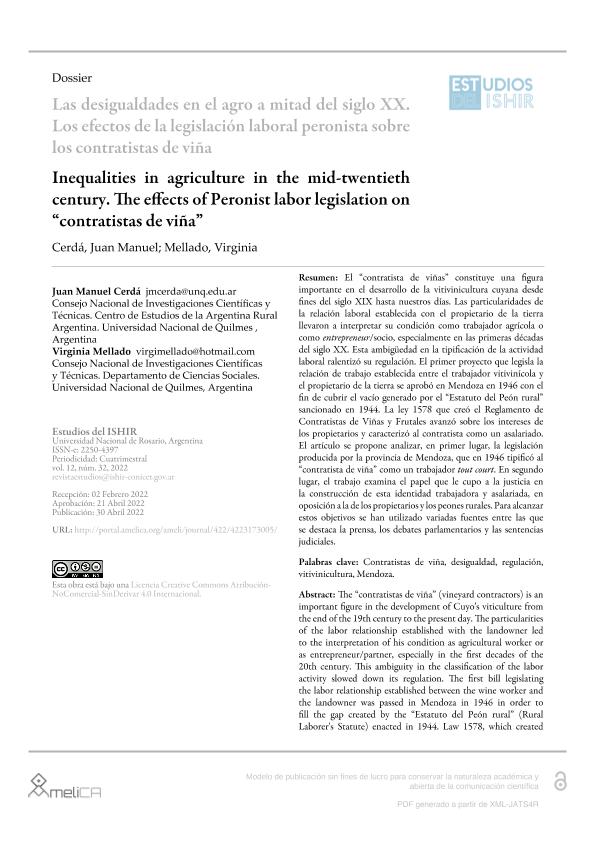Mostrar el registro sencillo del ítem
dc.contributor.author
Cerdá, Juan Manuel

dc.contributor.author
Mellado, Maria Virginia

dc.date.available
2024-01-12T14:47:02Z
dc.date.issued
2022-04
dc.identifier.citation
Cerdá, Juan Manuel; Mellado, Maria Virginia; Las desigualdades en el agro a mitad del siglo XX: Los efectos de la legislación laboral peronista sobre los contratistas de viña; Universidad Nacional de Rosario. Investigaciones Socio-históricas Regionales; Estudios del ISHiR; 12; 32; 4-2022; 1-23
dc.identifier.issn
2250-4397
dc.identifier.uri
http://hdl.handle.net/11336/223535
dc.description.abstract
El “contratista de viñas” constituye una figura importante en el desarrollo de la vitivinicultura cuyana desde fines del siglo XIX hasta nuestros días. Las particularidades de la relación laboral establecida con el propietario de la tierra llevaron a interpretar su condición como trabajador agrícola o como entrepreneur/socio, especialmente en las primeras décadas del siglo XX. Esta ambigüedad en la tipificación de la actividad laboral ralentizó su regulación. El primer proyecto que legisla la relación de trabajo establecida entre el trabajador vitivinícola y el propietario de la tierra se aprobó en Mendoza en 1946 con el fin de cubrir el vacío generado por el “Estatuto del Peón rural” sancionado en 1944. La ley 1578 que creó el Reglamento de Contratistas de Viñas y Frutales avanzó sobre los intereses de los propietarios y caracterizó al contratista como un asalariado. El artículo se propone analizar, en primer lugar, la legislación producida por la provincia de Mendoza, que en 1946 tipificó al “contratista de viña” como un trabajador tout court. En segundo lugar, el trabajo examina el papel que le cupo a la justicia en la construcción de esta identidad trabajadora y asalariada, en oposición a la de los propietarios y los peones rurales. Para alcanzar estos objetivos se han utilizado variadas fuentes entre las que se destaca la prensa, los debates parlamentarios y las sentencias judiciales.
dc.description.abstract
The “contratistas de viña” (vineyard contractors) is an important figure in the development of Cuyo's viticulture from the end of the 19th century to the present day. The particularities of the labor relationship established with the landowner led to the interpretation of his condition as agricultural worker or as entrepreneur/partner, especially in the first decades of the 20th century. This ambiguity in the classification of the labor activity slowed down its regulation. The first bill legislating the labor relationship established between the wine worker and the landowner was passed in Mendoza in 1946 in order to fill the gap created by the “Estatuto del Peón rural” (Rural Laborer's Statute) enacted in 1944. Law 1578, which created the Regulations for Vineyard and Fruit Contractors, advanced the interests of landowners and characterized the contractor as a salaried employee. The paper sets out to analyze, first, the legislation produced by the province of Mendoza, which in 1946 typified the "vineyard contractor" as a worker tout court. Secondly, the paper examines the role that justice played in the construction of this working and salaried identity, as opposed to that of landowners and rural laborers. In order to achieve these objectives, a variety of sources have been used, among which the press, parliamentary debates and court rulings stand out.
dc.format
application/pdf
dc.language.iso
spa
dc.publisher
Universidad Nacional de Rosario. Investigaciones Socio-históricas Regionales
dc.rights
info:eu-repo/semantics/openAccess
dc.rights.uri
https://creativecommons.org/licenses/by-nc-nd/2.5/ar/
dc.subject
CONTRATISTAS DE VIÑA
dc.subject
DESIGUALDAD
dc.subject
REGULACIÓN
dc.subject
VITIVINICULTURA
dc.subject.classification
Otras Historia y Arqueología

dc.subject.classification
Historia y Arqueología

dc.subject.classification
HUMANIDADES

dc.title
Las desigualdades en el agro a mitad del siglo XX: Los efectos de la legislación laboral peronista sobre los contratistas de viña
dc.title
Inequalities in agriculture in the mid-twentieth century: The effects of Peronist labor legislation on “contratistas de viña”
dc.type
info:eu-repo/semantics/article
dc.type
info:ar-repo/semantics/artículo
dc.type
info:eu-repo/semantics/publishedVersion
dc.date.updated
2024-01-11T10:05:01Z
dc.journal.volume
12
dc.journal.number
32
dc.journal.pagination
1-23
dc.journal.pais
Argentina

dc.journal.ciudad
Rosario
dc.description.fil
Fil: Cerdá, Juan Manuel. Universidad Nacional de Quilmes. Departamento de Ciencias Sociales; Argentina. Consejo Nacional de Investigaciones Científicas y Técnicas; Argentina
dc.description.fil
Fil: Mellado, Maria Virginia. Universidad Nacional de Quilmes. Departamento de Ciencias Sociales; Argentina. Consejo Nacional de Investigaciones Científicas y Técnicas; Argentina
dc.journal.title
Estudios del ISHiR
dc.relation.alternativeid
info:eu-repo/semantics/altIdentifier/url/https://web3.rosario-conicet.gov.ar/ojs/index.php/revistaISHIR/article/view/1565
dc.relation.alternativeid
info:eu-repo/semantics/altIdentifier/doi/http://dx.doi.org/10.35305/eishir.v12i32.1565
Archivos asociados
